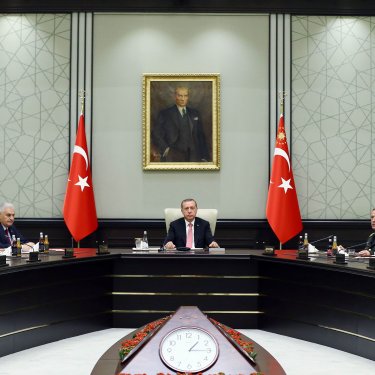Turkey: in latest escalation, 102 media outlets closed by decree

Reporters Without Borders (RSF) is dismayed to learn that the Turkish authorities closed 102 media outlets yesterday. It is the latest in a series of increasingly shocking developments in a purge of independent media launched after the coup attempt nearly two weeks ago.
The closure and expropriation of 45 newspapers, 16 TV channels, 23 radio stations, three news agencies and 15 magazines were ordered yesterday evening in the second decree-law issued under the state of emergency. Twenty-nine publishing houses were also closed.
The complete list, published in Turkey’s official gazette, is available here. All are suspected of “collaborating” with the movement headed by the US-based Turkish cleric Fethullah Gülen, which the authorities say was responsible for the 15 July abortive coup.
“The authorities have eliminated an entire swathe of the media landscape in one fell swoop,” said Johann Bihr, the head of RSF’s Eastern Europe and Central Asia desk. “The irreparable damage they are inflicting on pluralism and the rule of law goes far beyond the state of emergency. Punishing the coup attempt does not justify such extremes.”
The targeted media include such leading national publications as the newspaper Taraf and magazine Nokta. They also include many local newspapers. Fahrettin Dokak, the owner of the Izmir-based newspaper Ege’de Son Söz, issued a statement voicing his inability to understand why it was closed.
“Since 2009, the newspaper has always pursued an editorial line respectful of democracy, the law and universal press principles,” he wrote, adding that it was “never a FETÖ mouthpiece.” FETÖ is the acronym used by the government to brand the Gülen Movement as a “terrorist” organization.
Some of the media outlets closed under the decree-law had already been reined in by the authorities. They include Zaman, a daily that was placed under judicial control in March.
Since 25 July, arrest warrants have been issued for 89 journalists suspected of links with the Gülen Movement and several dozen of them are already in police custody. Fearing reprisals, some lawyers are now refusing to defend them.
Others prefer not to challenge the proceedings initiated against their clients for fear that the authorities could apply drastic measures allowed under the state of emergency, such as extending the maximum permitted period for police custody to 30 days.
Turkey is ranked 151st out of 180 countries in RSF’s 2016 World Press Freedom Index.
RSF’s previous press releases on the abortive coup and its consequences can be read here.


